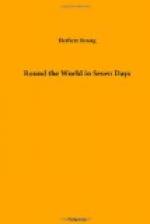It was the dusk of an evening in mid spring. Above, the sky was clear, washed by the rain that had fallen without intermission since early morning. Below, the chill of coming night, acting on the moisture-laden air, had covered the land with a white mist, that curled and heaved beneath the aeroplane in huge waves. It looked like a billowy sea of cotton-wool, but the airmen who had just emerged from it, had no comfort in its soft embrace. Their eyes were smarting, they drew their breath painfully, and little streams of water trickling from the soaked planes made cold, shuddering streaks on their faces and necks.
An hour ago they had sailed by Salisbury spire, calculating that a few minutes’ run, at two or three miles a minute, would bring them to their destination on the outskirts of Portsmouth. But a few miles south the baffling mist had made its appearance, and Smith found himself bereft of landmarks, and compelled to tack to and fro in utter uncertainty of his course. He was as much at a loss as if he were navigating a vessel in a sea-fog. To sail through the mist was to incur the risk of striking a tree, a chimney, or a church steeple; to pursue his flight above it in the deepening dusk might carry him miles out of his way, and though a southerly course must presently bring him to the sea, he could not tell how far east or west of his intended landing-place. Meanwhile the petrol was running short, and it was clear that before long his dilemma would be solved by the engine stopping, and bringing him to the ground willy-nilly, goodness knows where.
This was vexing enough, but in the particular circumstances it was a crowning stroke of misfortune. To-day was the twenty-first of his twenty-eight days’ leave: to-morrow he was to begin a round of what he called duty visits among his relatives; he would have to motor, play golf, dance attendance on girls at theatres and concerts, and spur himself to a thousand activities that he detested. There was no escape for him. Perhaps he could have faced this seven days’ penance more equably if he had had the recollection of three well-employed weeks to sweeten it. Even this was denied him. Ever since he came on leave the weather had been abominable: high wind, incessant rain, all the elements conspiring to prevent the enjoyment of his hobby. Rodier had suggested that he should apply for an extension of leave, but Smith, though he did not lack courage, could not screw it to this pitch. He remembered too vividly his interview with the captain when coming off ship.
“Don’t smash yourself up,” said the captain, “and don’t run things too fine. You’re always late in getting back from leave. Last time you only got in by the skin of your teeth, when we were off shooting, too. If you overstep the mark again you’ll find yourself brought up with a round turn, you may take my word for it.”
“I couldn’t beg off after that,” he said to Rodier. “Anyway, it’s rotten bad luck.”




